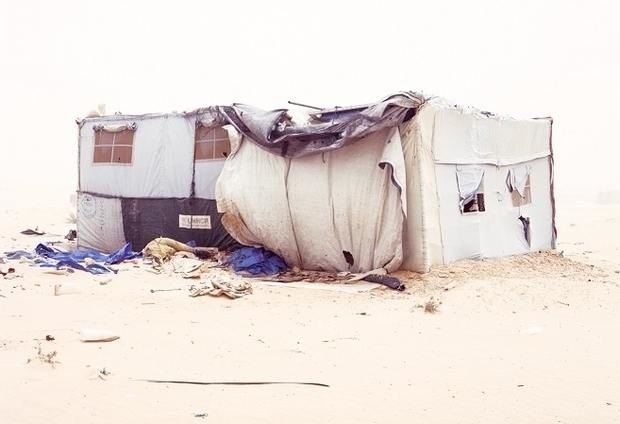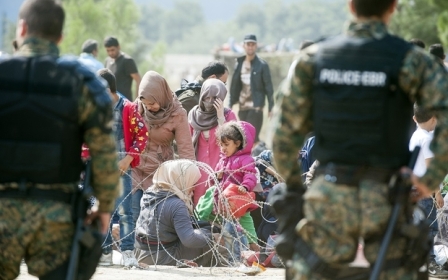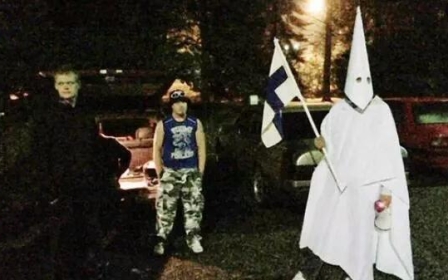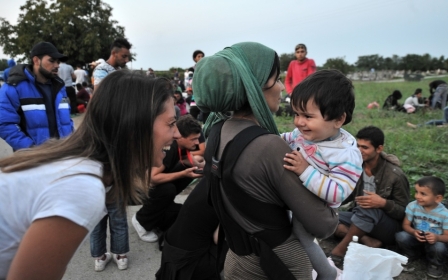Tunisia: An 'open air prison' for migrants
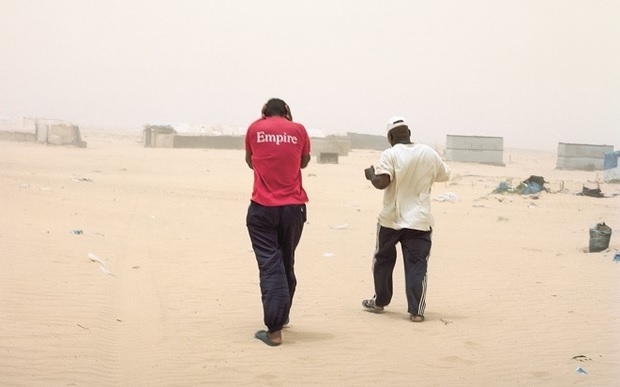
PARIS/TUNIS - They are displayed on the walls of the BAL, a Parisian arts centre devoted to photography and the representation of reality. The "refugees from the Choucha camp," as they are referred to in Tunisia, have had their pictures taken. Instead of residence papers, they got photos. Their day-to-day lives have been captured on film and are displayed in an exhibition given the title "Empire".
Over a period of two years, the French photographer Samuel Gratacap has recorded migrant life in the camp. He is almost apologetic for his boldness.
Despite such a lengthy observation period, he explains that he never became one of them. "In my case, I was in the camp by choice. I could enter and leave whenever I wanted."
The Choucha camp
The situation is very different for the migrants, many of whom describe Tunisia as an "open air prison". The situation of these refugees from the war in Libya is highly representative of the country's migration policy: non-existent according to organisations from civil society.
Shipwrecked, locked away in a detention centre, with a total absence of asylum legislation. There is no migratory policy in Tunisia, according to Ramy Khouilli from the Euro-Mediterranean human rights network (REMDH) in Tunis.
"Everything operates on an ad hoc basis. The authorities deal with situations on a case-by-case basis when an event occurs, according to the extent to which the associations and the media cover the issue."
When the war in Libya broke out in 2011, refugees flocked to the Tunisian border. Although Libyan families had the resources and the ability to obtain accommodations or be hosted by Tunisian families, migrants from Sub-Saharan Africa were in an altogether more complex situation.
Tunisia reacted to the humanitarian emergency, but over the long term nothing has been done to clarify the administrative status of these people.
An absence of asylum legislation
Repatriations were conducted by the embassies and international organisations for some foreigners fleeing Libya. For others, a refugee camp was opened in 2011, five kilometers from the Libyan border, near the Tunisian town of Ben Gardane: the Choucha camp, designed to hold several thousand people.
As Tunisia currently has no asylum legislation, it is the United Nations refugee agency (UNHCR) that investigates applications and grants the status of refugees.
In June 2013, the UNHCR, in charge of the camp, decided to close it as even back then the situation in Syria demanded additional resources. Hundreds of migrants found themselves in the street with no solution. With their applications for refugee status refused, they did not wish to return to their home countries, claiming that their lives were in danger.
The Tunisian authorities nevertheless promised them residence permits but, more than two years later, these have still not been issued.
"This experience leaves me with the impression that there is an enormous lack of dialogue between the authorities, which are seeking to process people within a strict administrative framework, and the reality of the lives of the migrants, who live in tents under very difficult conditions, said Samuel Gratacap.
The "Choucha refugees" are not the only ones to suffer from the delays of the Tunisian authorities. Since the revolution, through the Association of Sub-Saharan Students and Interns in Tunisia, many students from Sub-Saharan Africa present in the country have been complaining about delays in granting residence permits. These delays sometimes result in fines when leaving the country, payable by the resident even though it is not his or her fault.
For some migrants, the consequences of this illegal presence in the country are extremely serious.
Locked up and deported
With no official papers, the Choucha migrants cannot work or live normally. Some survive thanks to daily odd jobs, while others beg for money from the drivers of cars passing by on the road near what remains of the camp.
Mamadou* lives in a working-class district of Tunis. Originally from Ivory Coast, he fled the war in Libya and stayed for a while at Choucha. He has made many return trips between the capital and Ben Gardane. "There is no more work in the south. We used to unload the trucks that came from Libya but today it's difficult."
He explains that he comes to Tunis to find odd work. "Sometimes there is work. Sometimes not. I haven’t worked since the start of the month and I don’t know how I’m going to pay my share of the rent." Life in Tunis is far more expensive than in Ben Gardane, which prevents the migrants from Choucha from moving there.
Frustrated by their precarious situation, in late August, a dozen migrants demonstrated in front of the European Union headquarters in Tunis.
The police then asked them to report to the police station where they were arrested before being taken to the reception and referral centre of el-Ouardiya, the only detention centre in the country known to the public.
"Choucha is in a dangerous area, there’s trafficking going on and we can no longer stay there. We want a solution," said Bright Samson, a migrant in Choucha held in the el-Ouardiya detention centre, a few days after the demonstration.
Undocumented migrants or those subject to an expulsion order are regularly imprisoned "before being sent home," a spokesperson from the National Guard, the institution responsible for running the centre, told Middle East Eye.
Migrants who have been held there speak of difficult conditions, an absence of legal assistance and a lack of medical care.
A few days after their arrival in the detention centre, the Choucha migrants called human rights defence groups, often in a state of panic, explaining that they were being deported to the Algerian border.
According to Bright Samson, the Tunisian authorities dropped them off at the Algerian border, threatening them with force to cross over into Algeria. Pressure from the media and the associations finally made it possible for them to return to Tunisia.
Violating international law
Although the authorities claim that they do not carry out deportations, the reports indicate otherwise. Ramy Khouili of the REMDH isn't surprised: "It wouldn't be the first time. We should remember that in 2013, more than 190 migrants who arrived by sea and were saved from a sinking ship were victims of an attempted deportation to Libya. This was halted thanks to the involvement of humanitarian organisations."
This happened in spite of the fact that in 1988 Tunisia ratified the Convention Against Torture and Other Cruel, Inhumane or Degrading Treatments, according to which "No State shall expel, return or extradite a person to another State where there are substantial grounds for believing that he would be in danger of being subjected to torture." These grounds can be determined "by the existence, in the state concerned of a consistent pattern of gross, flagrant or mass violations of human rights".
Extraditing migrants to a military zone between Tunisia and Algeria where clashes have taken place between armed groups and troops, or to Libya, a country where conflicts are still raging, is therefore in contravention of the convention.
In search of a new policeman for the Mediterranean
In the opinion of the REMDH, it is also European policies which need to change in order to respect the rights of migrants and refugees.
"We argue that the idea of re-admission in Tunisia is unacceptable," declares Khouili, referring to the partnership agreements concerning mobility and immigration between the EU and Tunisia, which oblige the latter to agree to welcome persons expelled by a member state (a European one in this case) if they have transited beforehand via Tunisia, even if they are not of Tunisian nationality. The human rights groups are highly critical of this process.
Following a number of fatal shipwrecks in 2015 and the surge in refugees, the EU has reinforced since the spring its exterior policy regarding migration in cooperation with non-member states in order to prevent the arrival of migrants in Europe.
A number of political figures have stated their position publicly, often citing security concerns. A few days ago, former French president Nicolas Sarkozy spoke of creating detention centres in "peripheral countries to the Schengen area". These centres already exist in countries with worse human rights records.
During a trip to Tunis in the summer, Sarkozy had also stressed that Tunisia had a role to play in regulating migration. Once again Khouili is not surprised: "Since the fall of [former Libyan leader Muammar] Gaddafi, Europe has been looking for a new policeman for the Mediterranean to stem the migratory flow. Tunisia is emerging as the most likely candidate," he added ironically.
*The first name has been changed.
This article was originally published on Middle East Eye's French page on 24 September 2015 and translated by STiiL Agency.
New MEE newsletter: Jerusalem Dispatch
Sign up to get the latest insights and analysis on Israel-Palestine, alongside Turkey Unpacked and other MEE newsletters
Middle East Eye delivers independent and unrivalled coverage and analysis of the Middle East, North Africa and beyond. To learn more about republishing this content and the associated fees, please fill out this form. More about MEE can be found here.


